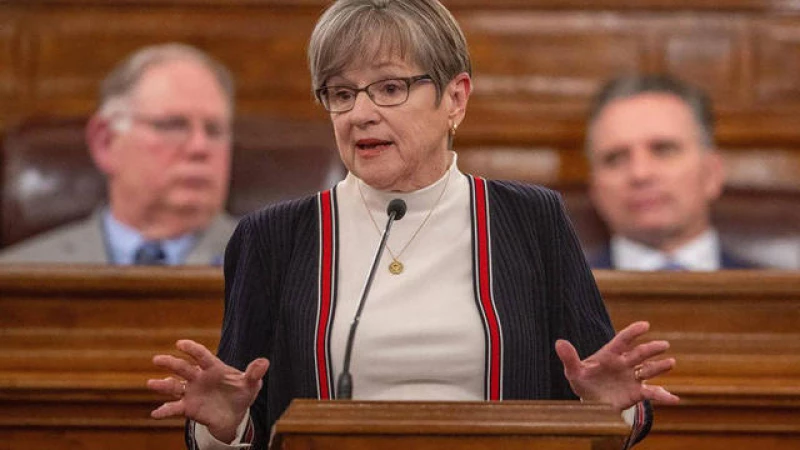Kansas' governor on Friday vetoed a proposed ban on gender-affirming care for minors, a measure to require from abortion providers and what she called a "vague" bill making it a crime to coerce someone into having an abortion.
Democratic Gov. Laura Kelly's actions set up a series of confrontations with the Republican-supermajority Legislature over those issues. The measures appeared to have the two-thirds majorities needed in both chambers to override vetoes, but GOP leaders' success depends on how many lawmakers are absent on a given day, especially in the House.
The two-term governor, who is term-limited, is a strong supporter of abortion and LGBTQ+ rights. Republicans control the Legislature, and they've joined other GOP lawmakers across the U.S. in rolling back transgender rights.
But Kansas has been an outlier on abortion among states with Republican legislatures because the Kansas Supreme Court declared in 2019 that the state constitution protects abortion rights, and a statewide vote in August 2022 decisively affirmed that position.
Following recent legislative decisions in Kansas, Governor Kelly allowed a GOP proposal regarding adult verification on pornography websites to become law without her signature. The new law, effective July 1, requires pornography sites to verify that visitors from Kansas are adults. Despite concerns about privacy and potential broad applications, Kansas joins Texas and a few other states in implementing this requirement.
However, Governor Kelly vetoed a bill that aimed to restrict gender-affirming care for minors, preventing Kansas from joining over 24 other states with similar bans. In her argument against the ban, Kelly emphasized the importance of parental rights and the potential harm targeting a small group could cause. She also highlighted the need to focus on the broader student population to improve educational outcomes.
The proposed bill would have prohibited surgery, hormone treatments, and puberty blockers for minors, limiting their care to therapy only.
Reacting to the veto, Jenna Bellemere, a transgender student at the University of Kansas, expressed relief and hoped that further attempts to pass such legislation would cease. The bill not only aimed to restrict gender-affirming care but also included provisions to penalize doctors violating the ban and restrict state funding for such treatments. Additionally, it would have prohibited the use of state resources for gender-affirming care, impacting institutions like the University of Kansas Medical Center.
Advocates for the bill claim that the prohibition will safeguard minors from untested, potentially hazardous, and lasting procedures. They point to the recent ruling by the National Health Service in England to stop routinely covering such treatments. Senate President Ty Masterson, a Republican from the Wichita area, criticized Kelly, stating, "The radical left influences her veto decisions."
"Laura Kelly will undoubtedly be on the wrong side of history due to her irresponsible veto of this sensible safeguard for Kansas youth," remarked Kansas House Speaker Dan Hawkins, a Republican from Wichita.
However, the bans imposed by U.S. states contradict the advice of prominent American healthcare organizations, including the American Medical Association and the American Academy of Pediatrics. Additionally, numerous medical experts argue that offering such care can reduce the risk of depression or suicidal ideation in transgender minors.
In the past year, Republican lawmakers have overridden Kelly's vetoes to prevent transgender girls and women from participating in female K-12 and college sports teams and to eliminate the state's legal recognition of transgender individuals' gender identities. As a result of the latter legislation, Kansas no longer permits transgender individuals to update the sex designation on their driver's licenses or birth certificates.
Despite the August 2022 referendum, Republican legislators persist in advocating for new abortion laws, contending that the public still backs "reasonable" restrictions and assistance for expectant mothers and new moms.
"Governor 'Coercion Kelly' once again displays her radical stance on abortion, showing a lack of compassion for women who may be coerced or forced into the procedure," stated Danielle Underwood, spokesperson for Kansans for Life, a prominent anti-abortion organization in the state.
The proposed anti-coercion legislation aims to penalize individuals who use physical or financial threats to pressure a woman or girl into obtaining an abortion, with potential consequences including a year of imprisonment or a fine of up to $10,000. Governor Kelly, in her veto explanation, highlighted that threatening someone is already considered a criminal offense.
Critics of the bill argue that its language is broad enough to encompass scenarios like a spouse threatening divorce or a live-in partner threatening to leave if the woman does not undergo an abortion.
"These bills, which aim to stigmatize, do not serve to enhance the health and welfare of Kansans," remarked Emily Wales, the president and CEO of Planned Parenthood Great Plains, an organization operating three abortion clinics in Kansas. "Their sole purpose is to shame reproductive healthcare."







